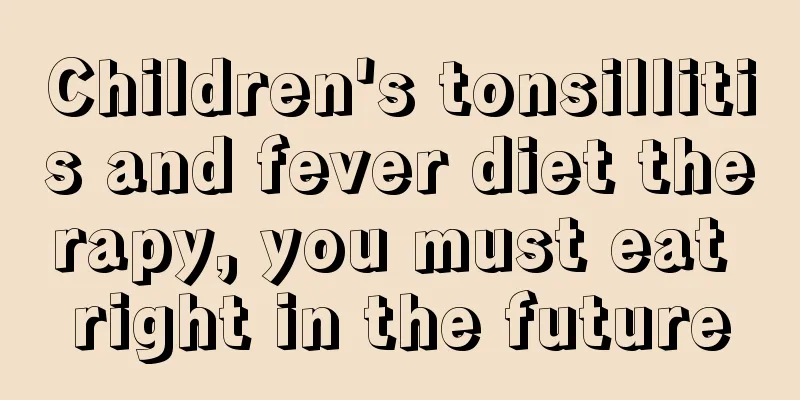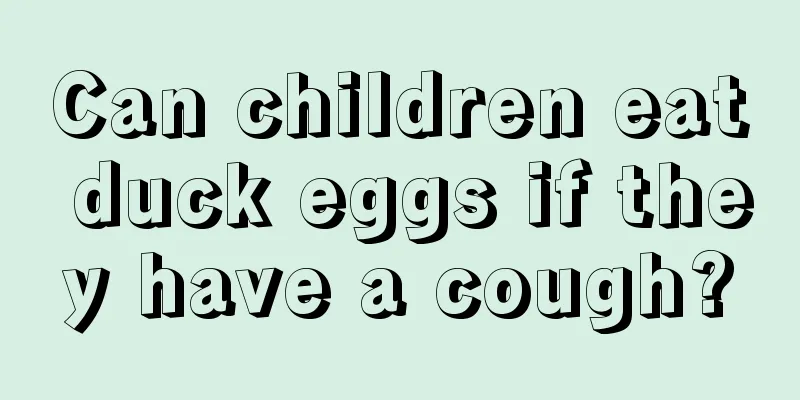Children's tonsillitis and fever diet therapy, you must eat right in the future

|
If a child suffers from tonsillitis, many medicines cannot be taken. Therefore, it is recommended that parents choose dietary treatment. By eating the right things, not only can nutrition be supplemented, but tonsillitis can also be treated without any side effects. 1. Diet therapy for tonsillitis in children During the period when your baby's tonsils are inflamed, you should pay attention to eating a light, easily digestible diet and eating small meals frequently. You can eat high-protein foods such as milk, soy products, eggs, foods rich in vitamin C such as fruits (bananas, apples, pears, watermelons, pomegranates, figs), and water chestnuts, vegetable soup, red date soup, etc. Generally, you should avoid greasy, sticky, and spicy foods. You should also drink more water to promote the excretion of toxins produced by pathogens as soon as possible to facilitate the body's recovery. The use of dietary therapy is also beneficial to the baby's physical recovery: (1) Boil 1 fresh radish, 10 green fruits and a little rock sugar in water and drink as tea. (2) 6 grams of sour plums, 25 grams of green fruits (olives), and appropriate amount of white sugar. Soak sour plums and green fruits in a casserole for half a day, then boil them and add sugar when taking. (3) 4-6 pieces of Sterculia lychnophora and appropriate amount of crystal sugar. Wash the Sterculia lychnophora and put it in a bowl, add appropriate amount of rock sugar for seasoning. Pour in boiling water, cover and simmer for half an hour. (4) Lily and banana stew: 15 grams of lily, 2 peeled bananas, appropriate amount of rock sugar, add water and stew together, then drink. Efficacy: Nourishes yin and clears the lungs, promotes fluid production and relieves dryness. Indications: Chronic tonsillitis of lung yin deficiency type, dryness and discomfort in the throat, slight pain, slight itching, cough without sputum or little and sticky sputum. Choking and difficulty in relieving oneself, enlarged laryngeal nucleus, or yellow-white pus spots. In the afternoon, the cheeks are red, the palms and soles are hot, and there is weakness in speaking. 2. What to do if children have tonsillitis If a baby with tonsillitis has a fever, the first thing to do is to reduce the baby's fever by using physical cooling methods. When the baby's temperature exceeds 38.5℃, take the baby to the hospital in time and take reasonable and effective treatment. If you fail to go to the hospital in time to take effective treatment, and only control the symptoms, it is easy to relapse. Repeated attacks will become chronic tonsillitis, which is more difficult to treat. Severe babies may also need surgery. Therefore, when a baby suffers from tonsillitis, parents must take the baby to the hospital for treatment in time. Strengthening the care of your baby in daily life can enhance your baby's resistance, reduce the chance of your baby suffering from tonsillitis, and even if your baby is sick, it can help your baby recover faster. To enhance your baby's resistance, you should let your baby develop good eating habits, ensure that the diet provided to your baby is nutritionally balanced, take your baby to outdoor activities more often, add or remove clothes for your baby in time when the weather changes, and try to avoid taking your baby to crowded public places to prevent your baby from repeatedly spreading diseases and causing low immunity. 3. Nursing for children with tonsillitis (1) Babies with tonsillitis should stay in bed and drink plenty of water to eliminate toxins produced in the body after bacterial infection. (2) You can gargle with light salt water several times a day to keep your mouth clean and odorless. (3) During the baby's treatment, the baby's body temperature and pulse changes should be closely observed. If the high fever persists, the doctor should be notified in time and effective treatment should be taken. (4) When your baby is sick, let him eat some light, easily digestible food, and eat more fruits and vegetables rich in vitamins. Do not let your child drink cold drinks or sugary carbonated drinks, as these can easily induce inflammation. Do not let your child smell oil smoke, which can irritate the baby. (5) Try not to take your baby to crowded places. During illness, the baby’s immunity is low and it is easy for him to be infected with other diseases. (6) If the weather changes, add or remove clothes for your baby in time and make sure to keep your baby warm. |
<<: Can children become smarter by eating pigeon eggs?
>>: Can children drink pure milk?
Recommend
What is the cause of the hard lump on the child's wrist?
The physical health of children is very important...
What to do if a three-year-old child has a fever of 39 degrees
Babies' insufficient immunity often leads to ...
What are the symptoms of calcium deficiency in a seven-month-old baby?
In fact, many times you need to pay great attenti...
How to change milk powder for newborns
It is not recommended to change milk powder for n...
Baby bath touch
After the baby is born, he needs to be bathed, an...
Children with amblyopia need early treatment
Amblyopia is a very common disease in daily life,...
Child coughs every morning
If a child coughs after getting up, it may be bec...
What to do if your five-month-old baby has repeated fevers
Children's fever is indeed a very tricky prob...
What vaccines should be given to four-year-olds?
We often see many parents taking their children t...
The baby's bones always make noises
Since babies' bodies are not fully developed ...
What to use for eczema on children's face
For children, eczema on the face is a common phen...
What should I do if my baby has indigestion and diarrhea?
The baby's body is very fragile and has not y...
The fastest way to cool down a child
Many adults are very concerned about the health o...
What to do if your child has fecal incontinence
Children's health is the biggest concern of p...
The harm of kissing baby's mouth
When adults see the cute look of babies, they can...









